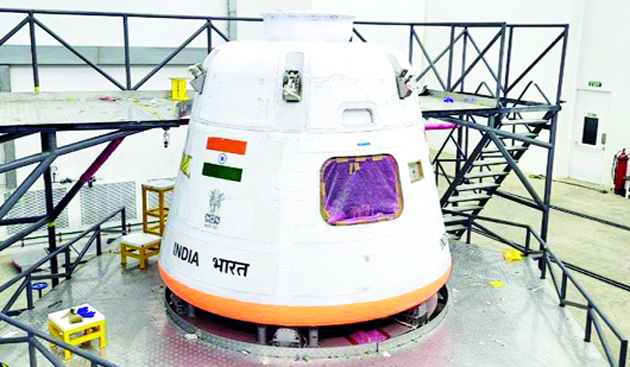Girish Linganna
In October this year, Prime Minister Narendra Modi led a significant meeting to evaluate the advancement of India’s Gaganyaan Mission and to define the future of the nation’s space exploration efforts.
Expanding on the achievements of such previous space missions as Chandrayan-3 and Aditya L-1, the Prime Minister has set ambitious targets for India, which include establishing an Indian Space Station, called the Bharatiya Antariksha Station, by 2035 and sending the first Indian astronaut to the Moon by 2040.
To ensure that humans are adequately prepared for extended space missions, including lengthy journeys to Mars which can take up to seven months, scientists are actively studying the impact of space on human well-being. This research encompasses investigations into the effects of the space environment on various aspects of health, including sexual health.
Recent research funded by NASA suggests that exposure to high levels of Galactic cosmic radiation, associated with such astronomical events as supernova explosions, refers to the highly energetic particles present in space. Highly energetic particles refer to particles that possess a significant amount of energy. In the context of space, these particles can include cosmic rays, which are typically high-energy protons, electrons and atomic nuclei. These particles can travel at very high speeds and have the potential to cause damage to living organisms and materials they come into contact with.
These particles can pose significant health risks to astronauts, including impairing vascular tissues and potentially resulting in conditions like erectile dysfunction, along with the microgravity conditions experienced in space, can negatively impact vascular tissues. This impairment of vascular tissues can result in erectile dysfunction. What is concerning is that the research indicates that, even after astronauts return to Earth and undergo an extended recovery period, these issues with sexual function can persist.
As manned missions to space are scheduled for the near future, the research emphasizes the importance of monitoring astronauts’ sexual health upon their return to Earth. Justin D La Favor, a co-author of the study from Florida State University, states that these findings highlight the need for close observation in this area.
Earth’s magnetosphere shields us from cosmic radiation, but astronauts on the ISS rely on artificial shielding. Despite this, they still encounter a week’s worth of cosmic radiation in space that is equal to a year’s worth of the same on Earth’s surface. However, when astronauts embark on missions to the Moon and Mars, they will have significantly less shielding from these particles compared to their experience on the ISS or that of astronauts planned for Gaganyaan.
The research team highlights that erectile dysfunction, which affects a significant portion of men over the age of 40 and has a considerable impact on overall life satisfaction, still lacks clear understanding regarding its implications for space travel. The research team also discovered that even minimal exposure to cosmic rays led to an elevation in oxidative stress. This elevation in oxidative stress can be harmful to cells, proteins and DNA-potentially causing damage. Oxidative stress occurs when there is an imbalance in the body, leading to harmful molecules, called ‘free radicals’, causing damage to cells and important molecules. This can contribute to health issues and the ageing process.
We are susceptible to oxidative stress in such conditions as chronic inflammation, exposure to environmental pollutants, smoking, excessive alcohol consumption, poor diet, certain medical conditions, such as diabetes and cancer, and neurodegenerative diseases, such as Alzheimer’s and the ageing process.
Oxidative stress is linked to a higher chance of erectile dysfunction due to how the body responds to damage in blood vessels. Exposure to cosmic rays, causing oxidative stress, is thought to impact the artery supplying blood to erectile tissue. Microgravity also has a similar, though less pronounced, negative effect on erectile function. The body fights oxidative stress by producing antioxidants naturally. The team’s study suggests that using certain antioxidants as a treatment could enhance the function of tissues exposed to cosmic rays.
“Despite the adverse effects of galactic cosmic radiation staying for a long time, we have learnt through our research that, by specifically targeting the redox and nitric oxide pathways in tissues, we could, possibly, treat erectile dysfunction,” the research team stated. Redox is a term formed from ‘reduction’ and ‘oxidation’, involving chemical reactions with electron transfer in the body. Targeting these reactions is possible through interventions, such as employing specific antioxidants.
(The author is a Defence, Aerospace & Political Analyst based in Bengaluru.)
Trending Now
E-Paper


